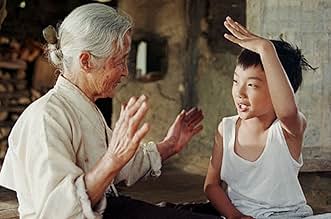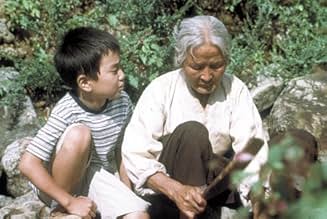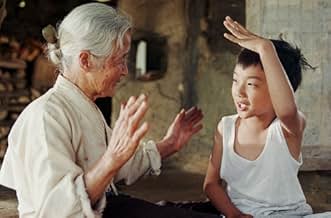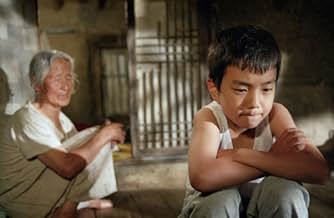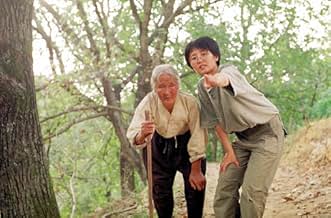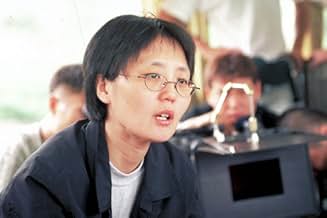IMDb RATING
7.7/10
6.2K
YOUR RATING
This is the story of a 7-year-old boy, Sang-woo, born and raised in the big city, and his mute grandmother, who has spent her whole life in a small rural village.This is the story of a 7-year-old boy, Sang-woo, born and raised in the big city, and his mute grandmother, who has spent her whole life in a small rural village.This is the story of a 7-year-old boy, Sang-woo, born and raised in the big city, and his mute grandmother, who has spent her whole life in a small rural village.
- Awards
- 12 wins & 11 nominations total
- Director
- Writer
- All cast & crew
- Production, box office & more at IMDbPro
Featured reviews
After reading comments about this film by folks expecting some "big payoff" in the end and being disappointed, wanting to tweak the script to make it more exciting, surprised the grandmother didn't "shout" at the boy (are you for real?), that they were "bored" and the story was "depressing", I simply don't believe many of these people actually watched the movie. Maybe it's the lack of skill reading subtitles, the patience of a long-tailed-cat with ADD in a room full of rocking chairs, or ignorance of any other culture other than their own. Who knows? Maybe film class does have its merits. Some people need to be taught how to watch a movie.
I felt compelled to comment on this film because of its simplicity. I recently watched "Rabbit- Proof Fence" whose filmmakers fascinated me with their desire to utilize simple, native folk as actors. The actions and emotions portrayed in 'The Way Home' were simple, and with few words, a few gestures, sometimes one can say more than what's contained in a volume of text. I admire a filmmaker who can use the entire screen to tell a story, and make the audience feel without having to say a word. Even the music was quiet, and used sparingly.
'The Way Home' is a fine, brief glimpse into a culture clash between young and old, rich and poor (of money, and of spirit). I think it's also an important film for western cultures to embrace, since respect for our elders seems to have fallen by the wayside.
I felt compelled to comment on this film because of its simplicity. I recently watched "Rabbit- Proof Fence" whose filmmakers fascinated me with their desire to utilize simple, native folk as actors. The actions and emotions portrayed in 'The Way Home' were simple, and with few words, a few gestures, sometimes one can say more than what's contained in a volume of text. I admire a filmmaker who can use the entire screen to tell a story, and make the audience feel without having to say a word. Even the music was quiet, and used sparingly.
'The Way Home' is a fine, brief glimpse into a culture clash between young and old, rich and poor (of money, and of spirit). I think it's also an important film for western cultures to embrace, since respect for our elders seems to have fallen by the wayside.
10shneur
The key to this movie is the contrast between the traditional "Eastern" values of Harmony and Inner Focus, and the intruding "Western" ones of Mastery and Acquisition. The seven-year-old protagonist brings with him the culture of the big city, Seoul in this case, but it could be anywhere, represented by his battery-operated game and the fact of his mother dumping him in the first place. He is confronted with his elderly grandmother, who simply refuses to engage him in the kind of outer battle he expects, neither to win it nor to lose it. We as audience continually visualize a "modern" parent either bullying this child into submission, or alternatively pandering to his oblivious self-centeredness. Instead, this caretaker evinces UNRELENTING respect for him as a human being: she never once blames, insults, or degrades him. Thus she sets him on the path of an inner journey which are left hoping will last a lifetime.
I've not seen anyone depict better the bittersweet relationship between a spoiled child and his patient grandmother than Korean director Lee Jeong-Hyang's ` The Way Home.' Nothing spectacular happens during seven-year-old Sang-woo's visit to grandmother's home in a rural village after his single mother drops him off. Changes occur, albeit predictably; the glory is in the small matters that will matter much to the boy as he matures long after the visit.
Why won't this film make it big if I like it so much? Well, the kid kills no one, smokes nothing, and speaks in child language, so audiences might just yawn. Additionally, the boy is a poor actor who hasn't been directed well. But grandma, now there is an actress. Kim Eul-boon was discovered in her native village, 78 years old and never seen a movie! Hunched over, skin leathery and crinkled, expressions minimalist, she embodies the infirmities of old age and the resolution of a tough spirit to care for herself and other ancient neighbors to the last breath. Her grandson, abusive and self-centered, is just another person to care for who she knows is worth saving, in unconditional love probably unacceptable to aggressive Americans.
When grandson plays with neighbor kids, he learns about the life's dangers by experiencing the menacing bull regularly chasing them down a particular stretch of necessary road. When he longs for the companionship of a neighbor girl, he learns you have to work at love. When he looks for grandma's love, he finds it in her smallest gestures, like buying and cooking him a chicken she thinks he wants when all he really wants is KFC.
And so this country life goes on with the boy erratically moving from resentment to love and back again in an endlessly ambivalent cycle. The batteries he uses up for his electronic games serve as metaphor for his city life's wasteful and empty energy.
The semi-modern buses coming to and from the market also serve as emblems of the tenuous relationship between city and province, grandmother and daughter, grandmother and grandson. So real is the slow and unglamorous rural life that you know Hyang has understood accurately that life and love are served slowly through its minor moments.
I guarantee you will never forget the charismatic grandmother outfitted as a lowly peasant-she is a survivor and one hell of an actress. The film is dedicated to all grandmothers. `Here's looking at you, Kid.'
Why won't this film make it big if I like it so much? Well, the kid kills no one, smokes nothing, and speaks in child language, so audiences might just yawn. Additionally, the boy is a poor actor who hasn't been directed well. But grandma, now there is an actress. Kim Eul-boon was discovered in her native village, 78 years old and never seen a movie! Hunched over, skin leathery and crinkled, expressions minimalist, she embodies the infirmities of old age and the resolution of a tough spirit to care for herself and other ancient neighbors to the last breath. Her grandson, abusive and self-centered, is just another person to care for who she knows is worth saving, in unconditional love probably unacceptable to aggressive Americans.
When grandson plays with neighbor kids, he learns about the life's dangers by experiencing the menacing bull regularly chasing them down a particular stretch of necessary road. When he longs for the companionship of a neighbor girl, he learns you have to work at love. When he looks for grandma's love, he finds it in her smallest gestures, like buying and cooking him a chicken she thinks he wants when all he really wants is KFC.
And so this country life goes on with the boy erratically moving from resentment to love and back again in an endlessly ambivalent cycle. The batteries he uses up for his electronic games serve as metaphor for his city life's wasteful and empty energy.
The semi-modern buses coming to and from the market also serve as emblems of the tenuous relationship between city and province, grandmother and daughter, grandmother and grandson. So real is the slow and unglamorous rural life that you know Hyang has understood accurately that life and love are served slowly through its minor moments.
I guarantee you will never forget the charismatic grandmother outfitted as a lowly peasant-she is a survivor and one hell of an actress. The film is dedicated to all grandmothers. `Here's looking at you, Kid.'
Commenter mwprods wrote below on date: 8 October 2002, this film "could probably flourish and impress even as a silent film." There is very little dialogue because the grandmother is a mute. This was a plus for me because for once I was able to keep up with the subtitles in a foreign film. Kidding aside, I was astonished by how such a quiet film touched me so. It makes me want to reevaluate my disdain for films from the silent film era. (I think I will hunt down "Metropolis" - I've heard critics speak highly of the silent film.) If you scan through all of the other comments you get suggestions for other films similar to Jibeuro (The Way Home).
From reading the other comments I was surprised to learn that it was the top grossing film of its year in South Korea. I know nothing about South Korea's film industry, but since it exports cars to the USA (Hyundai, Kia, etc), I assumed that their film industry would be similarly advanced. If it is, it is a pleasant surprise indeed that such a small film with first time actors ended up on the 'top of the heap'.
Imdb's page on the movie says that its available in DVD. I recommend people rent this sweet tale on a laid back weekend.
I plan to adopt a child within the USA's foster care system - many of which are difficult children. The grandmother character in this film showed me that with patience and persistence over possibly a long period of time one may get through to a difficult child - this film gave me more confidence that I could be successful as a foster parent.
From reading the other comments I was surprised to learn that it was the top grossing film of its year in South Korea. I know nothing about South Korea's film industry, but since it exports cars to the USA (Hyundai, Kia, etc), I assumed that their film industry would be similarly advanced. If it is, it is a pleasant surprise indeed that such a small film with first time actors ended up on the 'top of the heap'.
Imdb's page on the movie says that its available in DVD. I recommend people rent this sweet tale on a laid back weekend.
I plan to adopt a child within the USA's foster care system - many of which are difficult children. The grandmother character in this film showed me that with patience and persistence over possibly a long period of time one may get through to a difficult child - this film gave me more confidence that I could be successful as a foster parent.
I saw this movie a few weeks ago in my korean school, and thought it was pretty good. I had just recently found out that it was out in theatures. The grandma is a simple, loving mute and deaf grandmother, forced to take care of her daughter's whiny son. The boy does everything to annoy his grandmother, making me (and others, i bet) to smack that annoying brat upside the head and give him a good kick. Overall, it is an okay movie, but nothing i'll remember all my life. 7/10
Did you know
- TriviaAt the time of casting, Kim Eul-boon (Grandmother) had not only never acted before, but never even seen a film before.
- Crazy creditsBefore end credits: "Dedicated to all grandmothers"
- ConnectionsReferenced in Film Geek (2005)
- How long is The Way Home?Powered by Alexa
Details
- Release date
- Country of origin
- Official site
- Language
- Also known as
- Шлях додому
- Filming locations
- Production companies
- See more company credits at IMDbPro
Box office
- Budget
- $2,000,000 (estimated)
- Gross US & Canada
- $445,367
- Opening weekend US & Canada
- $29,737
- Nov 17, 2002
- Gross worldwide
- $24,952,738
- Runtime
- 1h 20m(80 min)
- Color
- Sound mix
- Aspect ratio
- 1.85 : 1
Contribute to this page
Suggest an edit or add missing content



